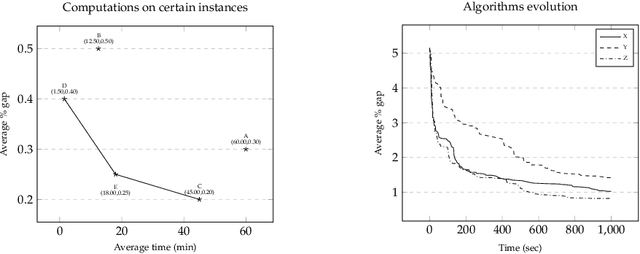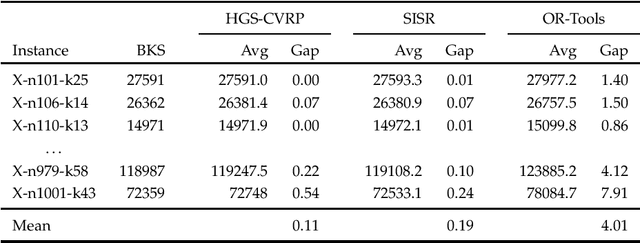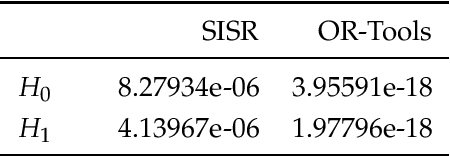Daniele Vigo
Hybrid Node-Destroyer Model with Large Neighborhood Search for Solving the Capacitated Vehicle Routing Problem
Aug 12, 2025Abstract:In this research, we propose an iterative learning hybrid optimization solver developed to strengthen the performance of metaheuristic algorithms in solving the Capacitated Vehicle Routing Problem (CVRP). The iterative hybrid mechanism integrates the proposed Node-Destroyer Model, a machine learning hybrid model that utilized Graph Neural Networks (GNNs) such identifies and selects customer nodes to guide the Large Neighborhood Search (LNS) operator within the metaheuristic optimization frameworks. This model leverages the structural properties of the problem and solution that can be represented as a graph, to guide strategic selections concerning node removal. The proposed approach reduces operational complexity and scales down the search space involved in the optimization process. The hybrid approach is applied specifically to the CVRP and does not require retraining across problem instances of different sizes. The proposed hybrid mechanism is able to improve the performance of baseline metaheuristic algorithms. Our approach not only enhances the solution quality for standard CVRP benchmarks but also proves scalability on very large-scale instances with up to 30,000 customer nodes. Experimental evaluations on benchmark datasets show that the proposed hybrid mechanism is capable of improving different baseline algorithms, achieving better quality of solutions under similar settings.
Dynamic operator management in meta-heuristics using reinforcement learning: an application to permutation flowshop scheduling problems
Aug 27, 2024Abstract:This study develops a framework based on reinforcement learning to dynamically manage a large portfolio of search operators within meta-heuristics. Using the idea of tabu search, the framework allows for continuous adaptation by temporarily excluding less efficient operators and updating the portfolio composition during the search. A Q-learning-based adaptive operator selection mechanism is used to select the most suitable operator from the dynamically updated portfolio at each stage. Unlike traditional approaches, the proposed framework requires no input from the experts regarding the search operators, allowing domain-specific non-experts to effectively use the framework. The performance of the proposed framework is analyzed through an application to the permutation flowshop scheduling problem. The results demonstrate the superior performance of the proposed framework against state-of-the-art algorithms in terms of optimality gap and convergence speed.
Guidelines for the Computational Testing of Machine Learning approaches to Vehicle Routing Problems
Sep 28, 2021



Abstract:Despite the extensive research efforts and the remarkable results obtained on Vehicle Routing Problems (VRP) by using algorithms proposed by the Machine Learning community that are partially or entirely based on data-driven analysis, most of these approaches are still seldom employed by the Operations Research (OR) community. Among the possible causes, we believe, the different approach to the computational evaluation of the proposed methods may play a major role. With the current work, we want to highlight a number of challenges (and possible ways to handle them) arising during the computational studies of heuristic approaches to VRPs that, if appropriately addressed, may produce a computational study having the characteristics of those presented in OR papers, thus hopefully promoting the collaboration between the two communities.
 Add to Chrome
Add to Chrome Add to Firefox
Add to Firefox Add to Edge
Add to Edge